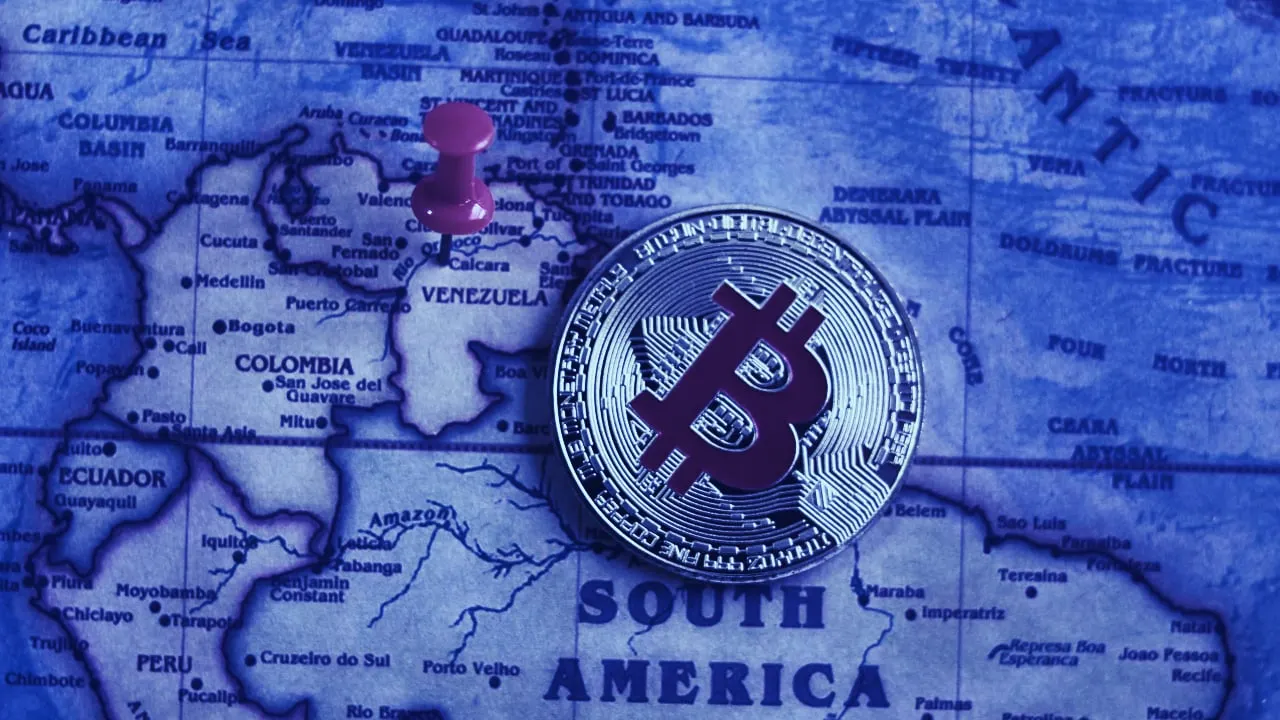In brief
- Venezuela has effectively nationalized cryptocurrency mining.
- The move means miners must risk being targeted by US sanctions.
- If miners work outside the national pool, they are subject to fines and other sanctions.
The Venezuelan government's recent decision to regulate Bitcoin mining has, in essence, given the government of Nicolas Maduro a monopoly over the industry and its associated components, from equipment sales to hosting.
But no one is more affected than miners themselves. Required to participate in a national mining pool, they find themselves in a lose-lose situation: They can choose to break the new Venezuelan law by mining with a private pool. Or they can become subject to US sanctions for carrying out economic activity in collaboration with the Venezuelan government.
Crypto meets politics
In 2018, President Donald Trump issued an executive order that slapped additional sanctions on Venezuela and the regime of its leftist president, Nicolas Maduro.
The order noted that Venezuela had sought to skirt sanctions in the past by issuing the Petro, a national cryptocurrency ostensibly tied to the price of Venezuelan oil and other commodities. The order made clear that any transactions that tried to get around US sanctions were prohibited. It explicitly warned “any person owned or controlled by, or acting for on behalf of, the Government of Venezuela.”
The executive order has scared away several service providers, which have chosen to cease operations in Venezuela rather than potentially run afoul of sanctions that made it difficult to work with the country’s banking system. The most recent to leave was Paxful, a popular peer-to-peer Bitcoin exchange, but the list includes Transferwise, Payoneer, Coinbase, and Kraken.
What’s in an address?
The most controversial portion of Venezuela’s new law, Article 19, obligates miners to participate in a national digital mining pool under the direction of SUNACRIP, the National Superintendency of Cryptocurrencies. Failure to comply with this order exposes them to fines and/or other sanctions.
Every time the Venezuelan national pool mines a block, earnings must be distributed among all its members. Because Bitcoin is transparent, it is easy to identify which pool mined a specific block. Through blockchain analysis, it is also possible to track how earnings were later distributed. So a third party—say an exchange or the US government—could blacklist and even move to seize addresses linked to that pool.
That’s a move José Angel Alvarez, president of Venezuela's National Association of Cryptocurrencies (Asonacrip), doesn’t foresee. He told Decrypt, "We think there is no executive order or technological, political, or financial blockade that can stop blockchain technology, so it is impossible to block transactions or addresses associated with that national pool."
Anibal Garrido, a professional trading instructor, disagrees. He told Decrypt, "I think that the addresses related to the pool could be negatively affected, especially considering that companies like Chainalysis are exclusively dedicated to tracking information in that regard."
Last month, for example, the US Department of Justice linked 280 cryptocurrency accounts to North Korean hackers and filed a civil forfeiture complaint to seize the accounts, making it difficult for the original owners to access the assets within. In short, if the DOJ acted similarly toward Venezuelan miners, they may have trouble exchanging their digital earnings for fiat.
Hi-ho, it’s off to work we go
To be clear, with this proclamation, Venezuela is not legalizing crypto mining. In fact, the activity has never been illegal. Still, crypto mining has not been liked by the authorities. As Decrypt previously reported, crypto miners have been subjected to government raids and have had their equipment seized. Some hope this new law puts an end to that situation—even if that means changing pools.
"We miners will adapt to anything,” said Juan Blanco, CEO of the crypto-centric company BitData. “What we want is to produce in this new era, because it will always be profitable to mine in Venezuela."
And Asonacrip is preparing a series of events to discuss the law and propose changes. "Next week we are doing an open summit where different specialists will talk about the subject," said José Angel Álvarez. One of the possible points of improvement is that the law should "allow private businesses to build their own pools."
Too bad that's against the law right now.





